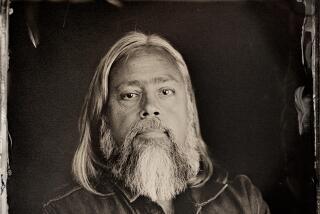A feral California childhood is revealed in Glen David Gold’s ‘I Will Be Complete’
Imagine “Home Alone” with a kid who is part Salvador Dali, part Holden Caulfield.
That’s the unique childhood of Glen David Gold, author of the bestselling novels “Carter Beats the Devil” and “Sunnyside.” The childhood in question is indisputably precocious, and his memoir, “I Will Be Complete,” is an extraordinary book about growing up in California.
Gold takes an old-fashioned approach to autobiography and goes back to the early days of his childhood when his English mother and newly wealthy father settle into a big, beautiful house in Corona del Mar. As his father’s fortune fails, so does his marriage, and when Gold is 11 years old his mother moves to San Francisco and falls in with a quasi-Bohemian crew of hedonists and hair-brained-scheme addicts.
Against this colorful backdrop, young Gold establishes himself as the adult in the room. At the very least, he is more rational than his mother, who has a tendency to fall for terrible men who take advantage of her.
Gold’s childhood is much more than merely interesting; it is riveting in the way of stories of children raised in the wild, except Gold skips over his feral period and advances straight to the head of Professor Henry Higgins’ class. “There is every reason, when looking at this with contemporary eyes, to fear for my safety,” he writes. “It was 1975 and San Francisco, however, and expressing fear at the unfamiliar or threatening would have been inelegant.”
When Gold was very young his parents had his IQ tested and the results were off the charts. Not only was Gold preternaturally intelligent, but he was aware of his superiority to others, namely his mother, whom he once attempted to placate by telling her, “It’s okay. Mommy’s brain is slow.”
See Glen David Gold read and sign “I Will Be Complete” at Skylight Books Thurs. June 28 at 7:30 p.m.
His unconventional upbringing triggers all kinds of alarms. For instance, he would occasionally pass out drinks at social functions and could hold his own in conversations with adults. “Sometimes an eleven-year-old smartass lent an exotic presence to my mother’s parties.” His biting humor and self-deprecating wit make this gifted child endearing rather than annoying so that when his time in the wilderness comes, we hope he can handle it.
His mother leaves her 12-year-old son to go to New York for a day or two. This trip stretches into a week until for all practical purposes she has moved out of the house and has to be shamed into coming back to San Francisco by her friends, only to leave again.
If the subject of his abandonment can be construed as “It Wasn’t as Bad as You Think,” the bulk of the book can be characterized as “Maybe It Was Worse Than I Thought.”
Gold enters into the world of romantic relationships where he must contend with the terror of —surprise, surprise — being abandoned, not once but over and over again. Gold tries to embrace the time-honored punk rock tradition of rejecting others before they can reject him (there’s even a spirited encounter at a Dead Kennedys show that ends in a riot), but it doesn’t suit him.
“Punk made me anxious. I was pretty sure if I came to a show, someone, more as a matter of policy than malice, would decide it was necessary to kill me.”
Gold offers portraits of Glen the tortured literature student, Glen the snarky bookstore employee. With each relationship he learns something about himself without getting closer to personal happiness. (He eventually married and was divorced from Alice Sebold, author of “The Lovely Bones,” but neither this nor his own literary successes are covered in “I Will Be Complete.”)
Gold’s knack for devastating insights are a marvel to read. “We are coming toward a lesson. It doesn’t seem like much: What’s under your skin is yours alone. People are separate. Skin is a boundary, as is the rest of you. The kinder lesson is that sometimes, the world gives you a connection, and it’s like a miracle. Love does go some distance running on miracles. But not that far.”
There are passages that dazzle, passages that fall flat in intricately designed ways, like an episode of “Seinfeld” in which the protagonist is revealed to be a putz who is either likable or clever but rarely both. But at around the 400-page mark one begins to worry there’s nothing coming but more relationships with unhappy endings, more lessons learned the hard way.
As his romances intensify, his relationship with his mother becomes more strained until it finally reaches the breaking point. Her inclination to choose bad partners leads her to a meth-addicted illiterate felon who inexplicably captures his mother’s heart and forces Gold to finally come to terms with his past.
While life may be ruled by chance, memoirs are not, and Gold delivers a conclusion for the ages that involves a dramatic confrontation with a shadowy figure from his childhood. “I Will Be Complete” is an audacious, boundary-shattering work that will be talked about for a very long time.
Ruland is the co-author of Keith Morris’ memoir, “My Damage: The Story of a Punk Rock Survivor,” and the host of the Vermin on the Mount reading series.
::
Glen David Gold
Knopf: 496 pp., $29.95
More to Read
Sign up for our Book Club newsletter
Get the latest news, events and more from the Los Angeles Times Book Club, and help us get L.A. reading and talking.
You may occasionally receive promotional content from the Los Angeles Times.








